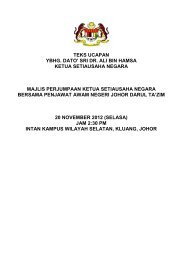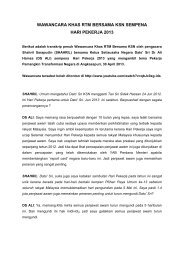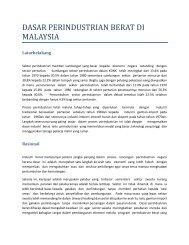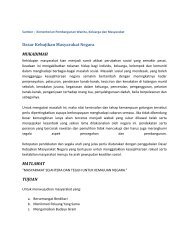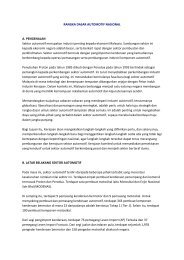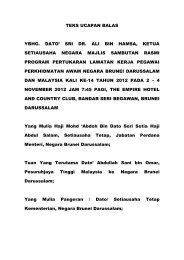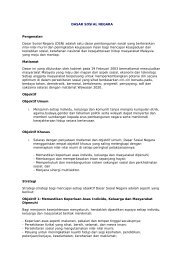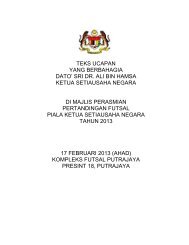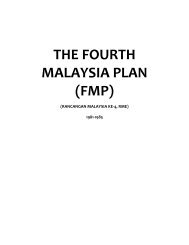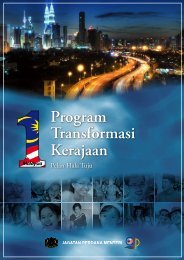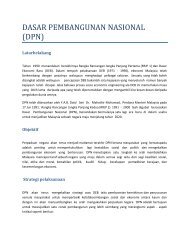GTP 2.0 - Prime Minister's Office of Malaysia
GTP 2.0 - Prime Minister's Office of Malaysia
GTP 2.0 - Prime Minister's Office of Malaysia
You also want an ePaper? Increase the reach of your titles
YUMPU automatically turns print PDFs into web optimized ePapers that Google loves.
REDuCING CRImE<br />
The Reducing Crime NKRA (CRI NKRA) is tasked<br />
with two simultaneous goals: to reduce crime<br />
in the country and to restore public confidence<br />
in their own personal security. While much has<br />
been accomplished in <strong>GTP</strong> 1.0 with respect to<br />
the former goal, the NKRA aims to work harder on<br />
the latter because a feeling <strong>of</strong> insecurity persists<br />
among the general public. Nonetheless, the<br />
reduction <strong>of</strong> index crime by 26.8% in <strong>GTP</strong> 1.0 is<br />
a huge accomplishment by any measure, and one<br />
that all <strong>Malaysia</strong>ns can stand behind.<br />
The NKRA scored a number <strong>of</strong> big wins in <strong>GTP</strong><br />
1.0, but perhaps one <strong>of</strong> the most significant<br />
achievements was <strong>Malaysia</strong> being declared in<br />
2011 the “most peaceful” Southeast Asian nation<br />
by the Global Peace Index, and fourth safest<br />
country in the Asia Pacific region. This same year,<br />
<strong>Malaysia</strong> was also ranked the safest country <strong>of</strong><br />
19 upper middle-income countries by the World<br />
Justice Project’s Rule <strong>of</strong> Law Index. The awards<br />
validate the efficacy <strong>of</strong> the NKRA’s initiatives.<br />
DElIvERING outComEs 2012:<br />
Index Crime: -7.6%, street Crime –41.3% (in 2012)<br />
Index Crime: -26.8% street Crime –40.8%<br />
(GtP 1.0 overall)<br />
The initiatives <strong>of</strong> the CRI NKRA further reduced incidences<br />
<strong>of</strong> Index Crime and Street Crime for the third consecutive<br />
year in 2012, testifying to the effectiveness <strong>of</strong> initiatives<br />
such as the Omnipresence Programme and the Safe City<br />
Programme. Both flagship initiatives were enhanced in 2012<br />
to broaden their scope and improve their efficacy. The two<br />
programmes count among the most significant efforts on<br />
the part <strong>of</strong> the Government to holistically address the issue<br />
<strong>of</strong> crime.<br />
Involving the community in the<br />
fight against crime<br />
The CRI NKRA implemented the United Against Crime<br />
campaign in 2012, which seeks greater public collaboration<br />
with law enforcement <strong>of</strong>ficials to help identify issues<br />
and to enhance community relationships. Among the key<br />
target groups for the NKRA’s outreach programme in 2012<br />
were women, schools, resident associations and car park<br />
operators.<br />
Fear <strong>of</strong> becoming a victim <strong>of</strong> crime: 57.3%<br />
Public concern about personal safety became a key issue<br />
in 2012 after a spate <strong>of</strong> high-pr<strong>of</strong>ile criminal cases.<br />
Increasing the number <strong>of</strong> arrests brought to trial<br />
(34.7% in 2012)<br />
A key frustration for the rakyat and law enforcers, the CRI<br />
NKRA made a concerted effort to increase the number <strong>of</strong><br />
cases that were brought before a judge within 12 months<br />
<strong>of</strong> arrest.<br />
A quality education system is the cornerstone<br />
<strong>of</strong> a skilled workforce, which in turn is vital for<br />
<strong>Malaysia</strong> to achieve its 2020 development goals.<br />
Over the three years <strong>of</strong> <strong>GTP</strong> 1.0, the Improving<br />
Student Outcomes NKRA (EDU NKRA) has shown<br />
consistent successes in its core initiatives, but<br />
perhaps most significant is the focused and<br />
continuous attention to specific areas.<br />
Over the course <strong>of</strong> <strong>GTP</strong> 1.0, the EDU NKRA<br />
has met with remarkable success in its key areas:<br />
increasing pre-school enrolment, screening<br />
primary students for basic numeracy and literacy<br />
skills, recognising high-performing schools,<br />
closing the gap between high- and underperforming<br />
schools, and encouraging greater<br />
school leadership.<br />
In recognition <strong>of</strong> their success, the NKRA<br />
stretched its target for 2012, and still managed<br />
to return commendable results.<br />
DElIvERING outComEs 2012:<br />
ImPRovING stuDENt outComEs<br />
Increasing pre-school enrolment<br />
The EDU NKRA oversaw the opening <strong>of</strong> 2,054 new preschool<br />
classes last year and saw enrolment creep up to<br />
80% <strong>of</strong> pre-school aged children. It also implemented the<br />
pilot for a quality-gauging programme in preparation for<br />
the enhancement <strong>of</strong> the initiative in <strong>GTP</strong> <strong>2.0</strong>.<br />
Continued screening <strong>of</strong> school-children<br />
under lINus<br />
The screening <strong>of</strong> the third cohort under the NKRA’s<br />
Literacy and Numeracy Screening (LINUS) programme<br />
showed a pr<strong>of</strong>iciency rate <strong>of</strong> 82% and 90% for each<br />
category respectively. In addition, the NKRA enhanced the<br />
way participants were screened to ensure that no student<br />
was left behind. Finally, the EDU NKRA confirmed its<br />
findings by screening some <strong>of</strong> the students under<br />
test conditions, which deliver a better gauge <strong>of</strong><br />
pr<strong>of</strong>iciency rates.<br />
Enhancing the New Deals for<br />
principals programme<br />
This is a core programme under the EDU NKRA which aims<br />
to incentivise principals and head teachers to improve<br />
the performances <strong>of</strong> their schools. A new category was<br />
introduced in 2012 to ensure that all principals and head<br />
teachers were given a fair opportunity to win a new deal<br />
regardless <strong>of</strong> the size or enrolment <strong>of</strong> their schools.<br />
Paving the way for upskilling English teachers<br />
About 61,000 English teachers were tested under<br />
the Cambridge Placement Test (CPT) to gauge their<br />
pr<strong>of</strong>iciency in the English Language. This is in anticipation<br />
<strong>of</strong> an initiative in <strong>GTP</strong> <strong>2.0</strong> that aims to provide remedial<br />
support for non-pr<strong>of</strong>icient teachers.<br />
moving schools out <strong>of</strong> band 6 and band 7<br />
(43.6% decrease or 164 schools in 2012, 66%<br />
or 420 schools in GtP 1.0)<br />
moving schools in to band 1 and band 2 (27.1%<br />
increase or 101 schools in 2012, 57% or 1009<br />
schools in GtP 1.0)<br />
The School Improvement Programme aims to close the gap<br />
between the highest performing and lowest performing<br />
schools by providing support and aid to schools falling into<br />
the two lowest categories, i.e., those categorised as Band 6<br />
and Band 7 schools. Meanwhile, additional support is also<br />
given to schools to help them improve their performance<br />
and raising them up to Band 1 and Band 2 standards.<br />
22 Government transformation Programme—Annual Report 2012 Chapter one 23<br />
Government transformation Programme—Annual Report 2012 Chapter one



